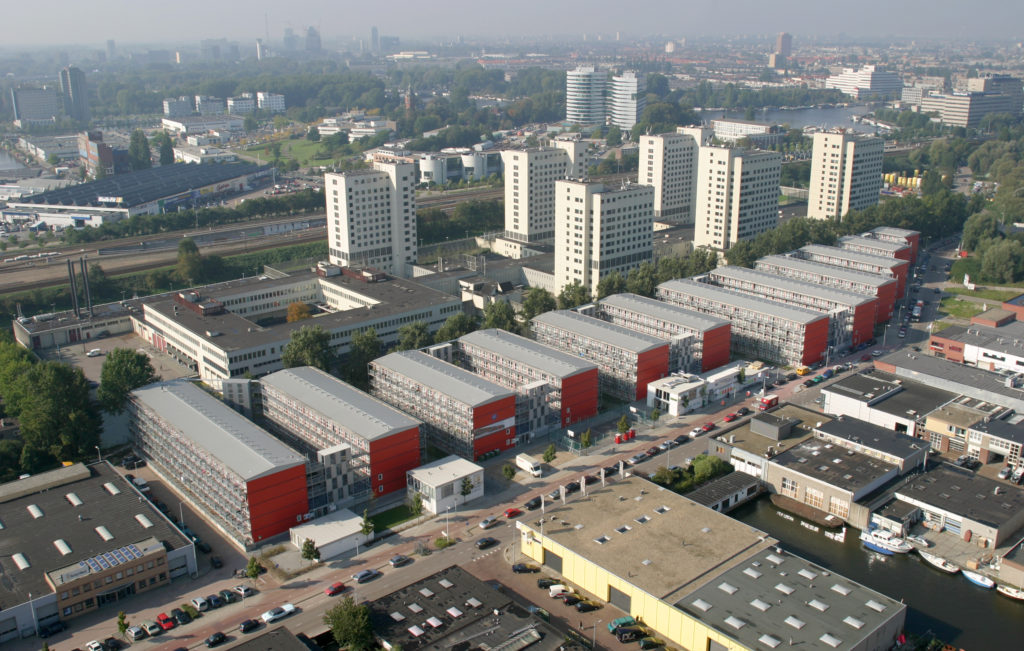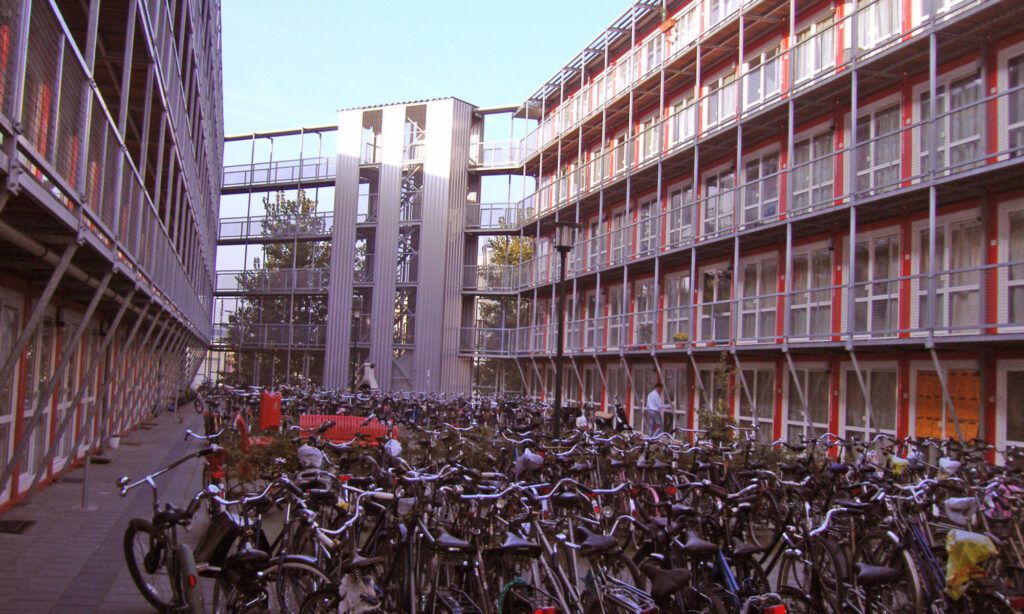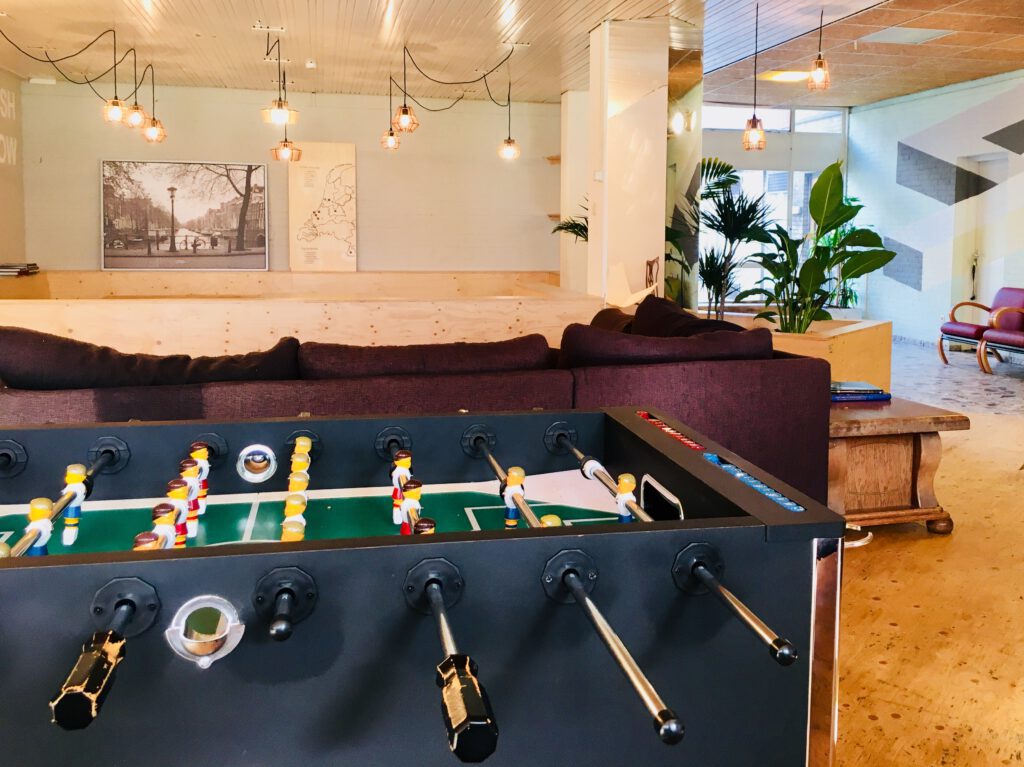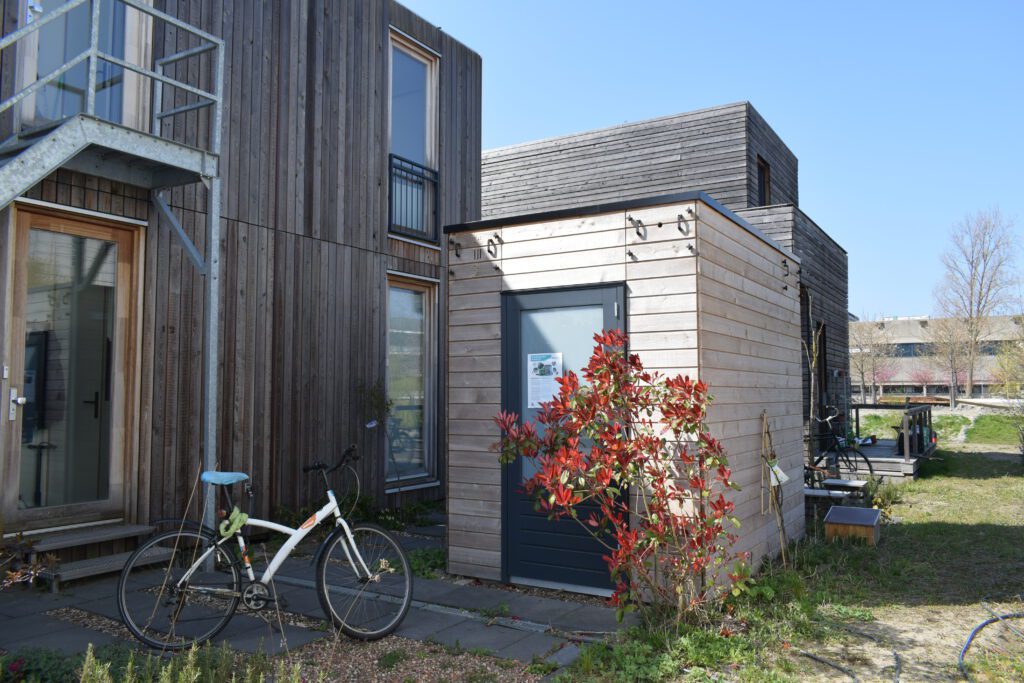Boring student rooms — no more! From repurposed churches to matchmaking, the Dutch are rethinking student housing with new out-of-the-box ideas.
The housing crisis has put many students under stress, poor living conditions, and even homelessness. The Dutch are now taking the crisis into their own hands with innovative new ideas.
Here are some of our favourites. ✅
1. Building mass student rooms from shipping containers
Amsterdam is one of the toughest cities to find housing and so one company built a whole new student campus in just a few months.
How could they possibly achieve that? By stacking thousands of shipping containers — just like LEGOs.

And guess what? You can barely tell from the inside that you’re in a shipping container — the rooms come complete with windows, kitchens, and even balconies, and there’s even a cafe onsite.
READ MORE | Student housing in the Netherlands: your guide to finding a room in 2023
While the containers aren’t particularly aesthetic, they’re quick to build, relatively cheap, and can be mass-produced: check, check, check! They’re now also in Groningen, Vlaardingen, Enschede, and soon Utrecht.

2. Matching students in need of homes with elderly people in need of company
Students who need housing, meet elderly people who need company — that’s a pretty genius solution to the housing crisis.

Way back in 2015 when the housing crisis was already a problem, a Deventer nursing home had the idea of promising students free accommodation in return for hanging out with their residents.
Students give 30 hours of volunteer work, including teaching residents how to email and use social media, in exchange for their housing. Clever, right?
3. Transforming abandoned churches into student housing
Instead of tearing down beautiful empty churches, why not convert them into new housing? It could be as close as students get to feeling like living in a castle — for less than €500 a month.
In Rotterdam, a former church now offers among soaring ceilings, stained glass, and religious history, over 200 rooms and apartments spread out over six floors. This doesn’t even include the rooftop that’s perfect for borrels!
Similarly, a smaller church in Utrecht houses 29 student rooms, a magnificent living room, and not one, but two gorgeous gardens.
4. Setting up camp in tent cities
Imagine getting all packed and ready to go for your exciting student life to begin in the Netherlands — to find out that your house for the next few weeks is a tent.

Far from an ideal situation, students found themselves having a campout around a bonfire while continuing their search for a room. In 2019, a student organisation in Tilburg set up a 25-day camping city for students unable to find housing yet.
READ MORE | 7 things the Dutch government is doing to tackle the Dutch housing crisis
It’s definitely not a traditional way to be housed (or a comfortable one) but we do give them points for creativity.
5. Repurposing empty offices
Office spaces can sit empty for years before a new tenant moves in or they’re demolished. So why not instead offer it to students to make it their home?
In Delft, a building that sat empty for 10 years is now giving 150 students a year a roof over their heads. From September 2023, the old Phillips headquarters in Eindhoven will also be transformed into student housing.

READ MORE | Cheap housing in the Netherlands: 5 top tips for finding your Dutch home
These transformed spaces have individual rooms, shared facilities, and big common rooms to hang out with the neighbours. Plus, it comes with an incredible view over the city if you’re on a top floor!
6. Working as an au pair while studying
Another option that a few students desperate for housing is to work part-time as an au pair. University students’ flexible schedules can be a perfect fit for families needing an extra set of hands.

In return for taking care of the children and picking them up from school, students usually benefit from a room in the house rent-free.
So, if you like children and manage your time well, this could be your chance to live in a big beautiful Dutch home!
7. “Anti-squatting” in unused buildings
Get ready for this one — it’s long been a common housing strategy in the Netherlands to live in a place as an anti-squatter. They’ve even got a dedicated page on Kamernet!
Anti-squatting (antikraak) means legally living in a building that will be empty for a few months (sometimes years) to prevent squatters from settling in.
it’s antikraak again with 6 other housemates!! and I have my own bathroom ^^ this will be my room! pic.twitter.com/gAQxor25ow
— 🦋 casey 💖 (@caorin__) September 14, 2021
Of course, anti-squatting isn’t a perfect deal. While you get cheap rent, you also sometimes end up getting no heating, poor sanitation, and very little long-term rental security.
READ MORE | Everything you need to know about anti-squatting in the Netherlands (aka ‘antikraak’)
Regardless, it’s a roof over your head and can be an opportunity to live in some cool places like office buildings, old schools, or houseboats that are sure to give you plenty of stories to tell your family.
8. Staying at a hotel made for students
Alright, staying at a hotel isn’t a realistic solution for everybody, but there are some in the Netherlands specifically aimed at students — meaning being more affordable and way more fun.
For example, The Social Hub rents out some rooms for long-term stays and regularly organises social events for its student residents. (Psst, plus if you’re a little lost living on your own for the first time, there are cleaning services and a restaurant right downstairs).

READ MORE | ‘No internationals’, a tale of exclusion in the Dutch housing market
Even if it’s definitely a bit more pricey than private housing, it’s been a huge help to many international students who constantly face the frustrating “no internationals” or “only Dutch” in housing ads.
9. Living in laboratories for sustainable housing
If we want to build millions of new apartments to reduce the housing crisis, it’s important that housing is sustainable and resilient in the long run. But to do this well, new materials and systems need to be tested first — what better way than in real living conditions?
Through DUWO, students can sign up to live in a beautiful wooden studio in Delft which actually acts as a real-life laboratory.

What does that mean? Basically, researchers stop by once in a while to get feedback and do a few experiments to check if the new innovative ideas are working well. This way, you participate in what the future of student housing might look like!
It currently gives 20 students a year a home, but we would love to see other companies follow their lead!
10. Connecting locals with students for homestays
The response to the housing shortage has mostly been to build new apartments but what about making efficient use of the already existing homes?
There are organisations catering specifically to matching students with hosts that have extra room and are open to offering guidance to newbies in town.

As a new student in town, wouldn’t it be great to not only have a room secured but simultaneously get insider tips on the best bars and hotspots from your roommate?
This way, students have way more housing options available to them. Plus, what better way to get to know all about how to eat tompouce and all that is a part of Dutch life?
11. Crashing at your university professors
We’re ending this list on a definitely surprising one.
Imagine moving out of your parent’s home and getting all excited about living the student life — to then you find out that your new roommate is your professor.

That’s precisely what happened in 2018, when Groningen University asked its staff to house students, especially internationals, until the students could find their own housing.
A spare couch or room can make a huge difference in a student’s desperate housing search. Unquestionably, it’s not an ideal situation but it’s a place to stay while looking for housing and out-of-the-box problem-solving. And well, it definitely makes for a unique story!
Tips to find student accommodation in the Netherlands
Here are some tips from our readers and fellow students for those looking for housing in the Netherlands. We know finding a place to live can be tough but you can do it!
- Start your search at least three months early
- Talk to people and ask friends to find out about vacant rooms
- Beware of scams — if something feels off, it probably is
- Consider living further away from the city centre and commuting by train
- Be open-minded — surprising solutions like these make for unforgettable experiences
What do you think about these solutions to the Dutch housing crisis? Tell us in the comments below!
Feature Image: Stadswonen Rotterdam
